Yemen’s Houthi rebels have vowed to continue attacking British ships in the Red Sea after sinking the British-owned Rubymar, the first ship completely destroyed as part of their campaign against Israel’s war in the Gaza Strip.
The Iran-backed militia called Britain a “rogue state” and blamed Rishi Sunak for his forces sinking the ship, saying his government should allow aid into Gaza if it wants to save the Rubymar.
“Yemen will continue to sink more British ships, and any fallout or other damage will be added to Britain’s bill,” Hussein al-Ezzi, deputy foreign minister of the Houthi-led government, said in a post on X.
“It is a rogue state that attacks Yemen and partners with the United States to sponsor continued crimes against civilians in Gaza.”
There are now fears that the sinking of the ship could cause an “environmental catastrophe” as its cargo of 21,000 tonnes of fertilizer threatens to spill and pose a major threat to marine life.
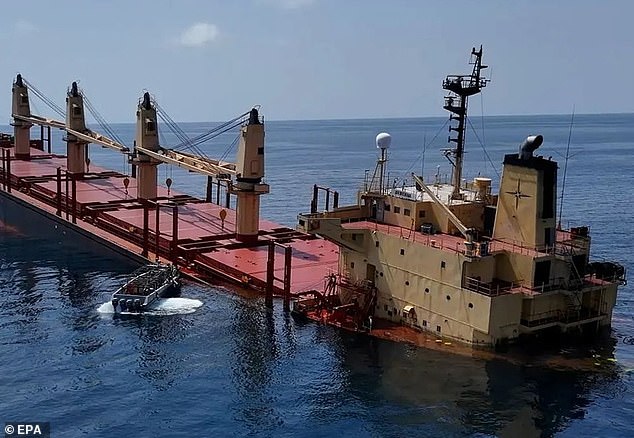
The British-owned Rubymar was the first ship completely destroyed as part of the Houthis’ campaign in the Red Sea over Israel’s war in the Gaza Strip.


There are now fears that the sinking of the ship could cause an “environmental catastrophe”


Houthi supporters protest against the United States and Israel and in support of the Palestinians, in Sana’a, Yemen, March 1.
The Houthis have repeatedly launched drones and missiles against international commercial shipping since mid-November, claiming they are acting in solidarity with the Palestinians against Israel’s military campaign in Gaza.
Its attacks in the Red Sea have disrupted global shipping, forcing companies to divert to longer, more expensive voyages around southern Africa, and stoking fears that the war between Israel and Hamas could spread and destabilize the entire Middle East. East.
The United States and Britain began attacking Houthi targets in Yemen in January in retaliation for attacks on Red Sea shipping.
Yesterday, the US military confirmed that the Belize-flagged Rubymar had sunk after being hit by an anti-ship ballistic missile fired by Yemeni Houthi militants on February 18.
The attack occurred in the Bab al-Mandab Strait, 35 nautical miles south of Al Mukha, and the ship began to “slowly take on water.”
The crew of the cargo ship, 171.6 m long and 27 m wide, were forced to “abandon ship” after the attack.
The UK Maritime Trade Operations (UKMTO) said yesterday that all crew are safe and that “authorities are investigating”.
The US military’s Central Command said this morning that the Rubymar sank at 2.15am local time on Saturday and released an image of the ship on its side as it sank.
“The approximately 21,000 metric tons of ammonium phosphate sulfate fertilizer the ship was carrying present an environmental risk in the Red Sea,” it said in a statement. “As the ship sinks, it also presents a subsurface impact risk to other ships transiting the waterway’s busy shipping lanes.”
Greenpeace today called for an urgent emergency response, saying the shipwreck presents an “imminent danger.”
“Without immediate action, this situation could become a major environmental crisis,” said Julien Jreissati, Greenpeace MENA program director.
The ship’s hull could be severely damaged, releasing the fertilizer and “causing cascading effects throughout the food web,” he said.
“This alteration could have far-reaching consequences, affecting several species that depend on these ecosystems and, in turn, potentially impacting the very livelihoods of coastal communities.”
Yemen’s internationally recognized government-in-exile, which has been backed by a Saudi-led coalition since 2015, said the Rubymar sank on Friday night when a storm swept over the Red Sea.
Prime Minister Ahmed Awad Bin Mubarak also called the ship’s sinking “an unprecedented environmental disaster.”
“It is a new disaster for our country and our people,” he wrote on X, formerly Twitter.
“Every day we pay for the adventures of the Houthi militia, which did not limit itself to plunging Yemen into coup disaster and war.”
The Houthis have occupied Yemen’s capital, Sana’a, since 2014, ousting the government. It has fought a Saudi-led coalition since 2015 in a stalemate war.
The Iranian-backed Houthis, who had claimed that the ship sank almost instantly after the attack, did not immediately acknowledge the ship’s sinking.
Many ships have already moved away from the Red Sea route, through which much of the world’s trade passes.
The sinking of the Rubymar could lead to more diversions and higher insurance rates for ships navigating the waterway, which could increase global inflation and affect aid shipments to the region.
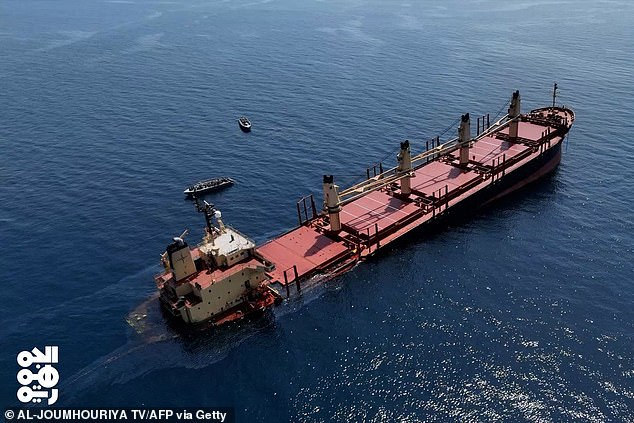

The ship was abandoned for up to 12 days before it finally sank.
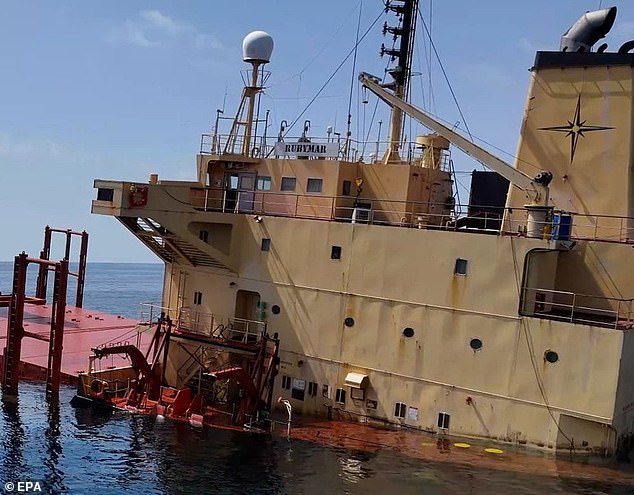

A photograph provided by the Yemeni channel Al-Joumhouriya TV shows the cargo ship Rubymar, sinking after being damaged in a missile attack by the Houthis in the Red Sea.
Earlier, US forces attacked and destroyed a Houthi surface-to-air missile in Yemen on Friday after deciding it posed an “imminent threat” to US aircraft, US Central Command in the Middle East announced.
The Houthis, who control much of war-torn Yemen, have been attacking shipping in the Red Sea since November in a campaign they say is in solidarity with Palestinians in Gaza amid the war between Israel and Hamas.
The United States leads a naval coalition to protect ships in this important waterway and has also carried out airstrikes on Houthi territory, both alone and alongside Britain.
On Friday afternoon, “U.S. forces conducted a self-defense strike against an Iran-backed Houthi surface-to-air missile that was prepared to be launched,” CENTCOM said in a statement, adding that it had “determined that (the missile ) presented an imminent threat.” threat to US aircraft in the region.
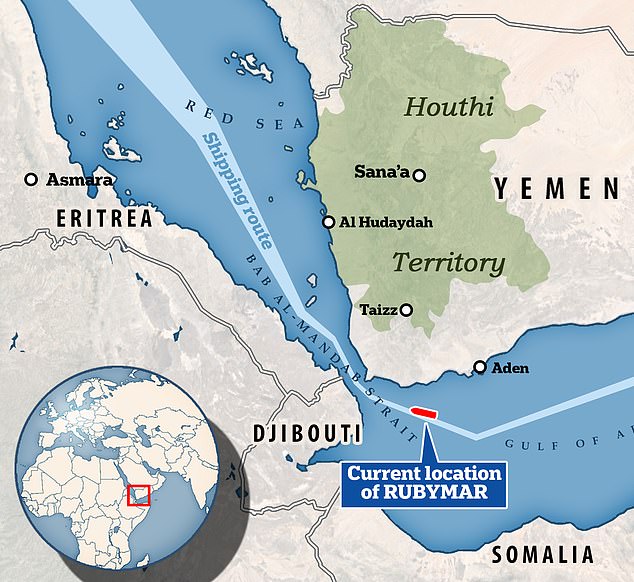



The bulk carrier had been leaking oil after being attacked by the terrorist group while at sea.
He went on to say that the Houthis launched an anti-ship missile into the Red Sea on Friday night, but “there was no hit or damage to any ships.”
Last weekend, US and British forces carried out strikes against 18 Houthi targets in eight locations in Yemen, including weapons storage facilities, attack drones, air defense systems, radars and a helicopter, according to a joint statement. .
One person was killed and eight wounded in the attacks, the Houthis’ official news agency said.
Since November, rebels have repeatedly attacked ships in the Red Sea and surrounding waters due to the war between Israel and Hamas.
Those ships include at least one with cargo destined for Iran, the Houthi’s main benefactor, and an aid ship that later headed to Houthi-controlled territory.
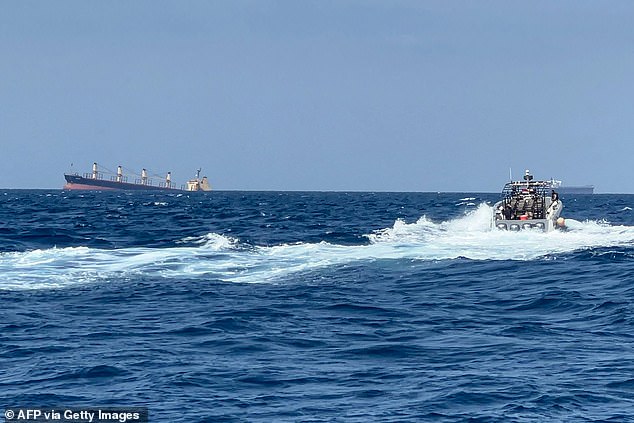

Rescuers hoped to save the ship that had been abandoned hours after it was attacked by Iranian-backed rebels.
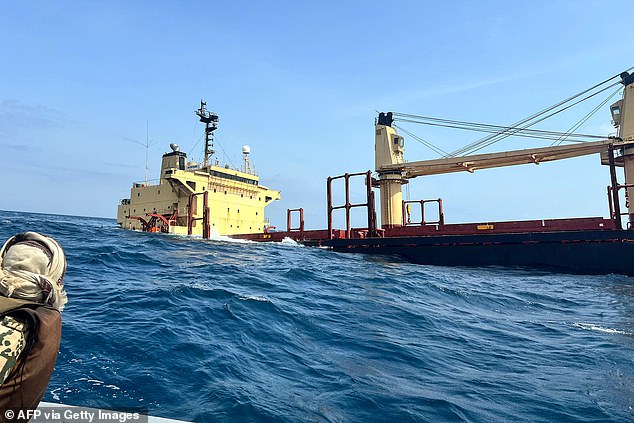

The bulk carrier is the first international ship sunk during the conflict
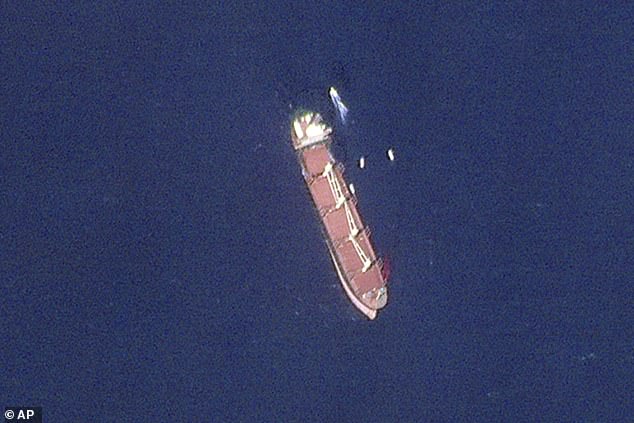

The Rubymar was carrying a cargo of fertilizers when it was attacked 35 miles off Yemen.
Despite more than a month of US-led airstrikes, Houthi rebels remain capable of launching major attacks.
That includes the attack on the Rubymar and the downing of a US drone worth tens of millions of dollars.
The Houthis insist their attacks will continue until Israel stops its combat operations in the Gaza Strip, which have angered the broader Arab world and seen the Houthis gain international recognition.
However, in recent days there has been a slowdown in attacks. The reason remains clear.
